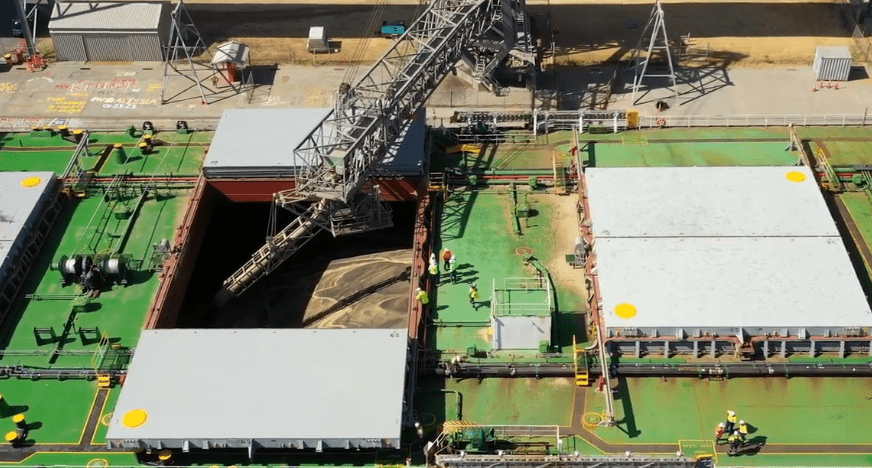
Canola pours into one of the holds on the Efessos Wave at CBH Group’s Albany terminal. Image: CBH Group
WESTERN Australian bulk handler CBH Group has reported its best rail performance for January on record, with rail and shipping performance continuing above the past five-year average figures.
CBH railed 989,000 tonnes to all four ports and the Metro Grain Centre (MGC) in January 2023, setting a record and surpassing the previous one of 971,000t set in January 2019.
This achievement also marks the seventh consecutive month of record rail performance starting in July 2022.
From a road movement perspective, 864,000t was moved by road to port and MGC, inclusive of depot moves.
Road outloading also continues to perform strongly, well above the previous five-year January average of 800,000t.
Shipping performance remained strong in January, with 1.73 million tonnes (Mt) shipped across the state.
The Albany Grain Terminal shipped 363,000t in January, 3000t up on the previous record set in January 2017.
From October 2022 to January 2023, CBH has shipped a total of 6.63Mt, the highest harvest-period tonnage exported in the co-operative’s 90-year history.
The previous best October-January shipping over harvest was in FY2017, when 4.9Mt was shipped.
“As harvest comes to a close, CBH will be transitioning to a busy outloading program, and we look forward to continuing the gains we have made in strengthening our supply chain,” CBH chief operations officer Mick Daw said.
Trial lifts bar for Albany
On the back of the rail milestone, CBH successfully loaded the largest vessel to berth at the company’s Albany terminal during the last days of January.
After being filled with 64,003t of canola, the post-Panamax type vessel Efessos Wave is on its way to Ghent in Belgium.
Efessos Wave is a post-panamax vessel, meaning it has a wider beam than standard panamaxes which are the biggest class of vessel generally used to export Australian grain.
The shipment was part of a trial which is looking into ways CBH can safely receive and maximise capacity of larger vessels at Albany.
CBH head of chartering Pia Wyngaard said if the trial is successful, it will have significant and positive across the CBH’s business.
“This higher loaded tonnage trial meant we were able to load about 4000 tonnes more than we would have otherwise,” Ms Wyngaard said.
“More loaded grain will increase port throughput, reduce freight costs, and provide greater supply chain efficiencies.
“Additionally, it will help to reduce emissions – using larger and full ships means less ships.”
As part of the trial, CBH’s Australian Bulk Stevedoring team in Albany led by Greg Flett, designed a tailored, workable plan with the master of the vessel.
The plan aimed to load, stow, and trim the canola to fill and be weighted safely across the vessel’s seven holds.
Each hold would carry 6900t-10,700t of canola.
CBH Albany port manager Richard Doak said the trial will most likely change how CBH utilises the port going forward.
“We load on average about 80 vessels each year from our berth with an average shipping tonnage of 2.8-2.9Mt per annum, depending on harvest size and customer demand,” Mr Doak said.
“With WA grain growers delivering record harvests and our CBH Path to 2033 requiring capacity to export 3Mt per month in 10 years’ time, we need to adapt our port systems and their planning and operations to support the changing circumstances.”
Source: CBH Group

HAVE YOUR SAY